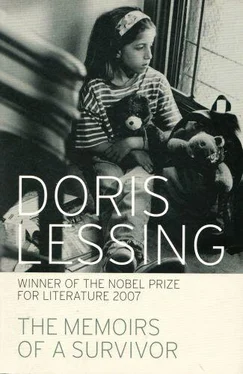I think this is the right place to say something more about 'it'. Though of course there is no 'right' place or time, since there was no particular moment marking — then or now — 'its' beginning. And yet there did come a period when everyone was talking about 'it'; and we knew we had not been doing this until recently: there was a different ingredient in our lives.
Perhaps I would have done better to have begun this chronicle with an attempt at a full description of 'it'. But is it possible to write an account of anything at all without 'it' — in some shape or another — being the main theme? Perhaps, indeed, 'it' is the secret theme of all literature and history, like writing in invisible ink between the lines, which springs up, sharply black, dimming the old print we knew so well, as life, personal or public, unfolds unexpectedly and we see something where we never thought we could — we see 'it' as the ground — swell of events, experience… Very well then, but what was 'it'?.. I am sure that ever since there were men on earth 'it' has been talked of precisely in this way in times of crisis, since it is in crisis 'it' becomes visible, and our conceit sinks before its force. For 'it' is a force, a power, taking the form of earthquake, a visiting comet whose balefulness hangs closer night by night distorting all thought by fear — 'it' can be, has been, pestilence, a war, the alteration of climate, a tyranny that twists men's minds, the savagery of a religion.
'It', in short, is the word for helpless ignorance, or of helpless awareness. It is a word for man's inadequacy?
'Have you heard anything new about it?'
'So and so said last that it…'
Worse still when the stage is reached of 'Have you heard anything new', when 'it' has absorbed everything into itself, and nothing else can be meant when people ask what is moving in our world, what moves our world. It. Only it, a much worse word than 'they'; for 'they' at least are humanity too, can be moved, are helpless, like ourselves.
'It', perhaps — on this occasion in history — was above all a consciousness of something ending.
How would Emily put what she felt into words? She would describe this, perhaps, in terms of that image of her sweeping, sweeping, the sorcerer's apprentice put to work in a spiteful garden against floods of dying leaves that she could never clean away no matter how hard she tried. Her sense of duty but expressed in images — she could not say of herself that yes, she was a good little girl and not a bad dirty little girl; a good little girl who must love cherish and protect her brother, her baby, the defenceless, the powerless, the amiably indifferently smiling, who sat there all loose and slack in their damp strong — smelling white wool. 'It was so hard,' she might say. 'Everything was so difficult, such an effort, such a burden, all those children in the house, not one of them would do a thing to help unless I got at them all the time, they turned me into a tyrant and laughed at me, but there was no need for that, they could have had something equal and easy if they had done their parts but no, I always had to overlook everything, comb their dirty hair and see if they had washed and then all those sores that they got when they wouldn't eat sensibly, and the horrible smell of disinfectants all the time that the government supplied and the way June got sick, it drove me crazy with worry, she kept getting ill for no particular reason — that was it, there was never any good reason for things, and I worked and I worked and it was always the same, something happened and then it all came to nothing.'
Yes, that is probably how Emily's version of that time would sound.
June, returning with Emily to my flat one day, about a fortnight after her induction into womanhood — I put it like that because this was how she obviously felt it — had changed physically, and in every way. Her experience had marked her face, which was even more defenceless, in her sad-waif style, than before. And she was looking older than Emily. Her body still had the flat thickness through the waist of a child, and her breasts had fattened without shaping. Anxiety, or love, had made her eat enough to put on weight. We saw her, that eleven — year-old, as she would look as a middleaged woman: the thick working body, the face that accommodated, that always seemed able to accommodate, two opposing qualities: the victim's patient helplessness, the sharp inquisitiveness of the user.
June was not well. Our questions brought out of her that this was nothing new, she hadn't been too good 'for quite a time'. Symptoms? 'I dunno, jst feel bad, you know what I mean.'
She had stomach pains and frequent headaches. She lacked energy — but energy cannot be expected of a Ryan. She 'jst didn't feel good anywhere at all, it comes and goes, reely'.
This affliction was not only June's; it was known to a good many of us.
Vague aches and pains; indispositions that came and went, but not according to the terms and times prescribed by the physicians; infections that seemed to be from a common source, since they would go through the community like an epidemic, but not with an epidemic's uniformity — they demonstrated their presence in different symptoms with every victim; rashes that did not seem to have any cause; nervous diseases that could end in bouts of insanity or produce tics or paralyses; tumours and skin diseases; aches and pains that 'wandered' about the body; new diseases altogether that for a time were categorised with the old ones for lack of information until it became clear that these were new diseases; mysterious deaths; exhaustions and listlessness that kept people lying about or in bed for weeks and caused relatives and even themselves to use the words malinger and neurotic and so on but then, suddenly vanishing, released the poor sufferers from criticism and self-doubt. In short there had been for a long time a general increase in illness, both traditional and newly-evolved, and if June complained of 'just not feeling good anywhere, do you see what I mean?' — then we did, for it was common enough to be classed as a recognisable illness in itself. June decided to move in with us, 'for a few days,' she said, but what she needed was to evade the pressures, psychological or otherwise, of Gerald's household, and Emily and I knew, if June did not, that she would have liked to leave there altogether.
I offered the big sofa in the living-room to June, but she preferred a mattress on Emily's floor, and even, I think, slept on it, though of course I wondered. Silently wondered. Too often had I experienced a sharp shocked reaction to questions asked innocently. I really did not know if Emily and June would consider lesbianism as the most normal thing in the world, or as improper. Styles in morals had changed so sharply and so often in my lifetime, and were so different in various sections of the community, that I had learned long ago to accept whatever was the norm for that particular time and place. I rather believe that the two girls slept in each other's arms for comfort. Of course I could have no doubt, after what Emily had told me, about how she must feel now she had the child, her 'real friend', alone with her there. Almost alone — there was me and there was Hugo. But at least there weren't so many others around all the time.
Emily tried to 'nurse' June. That is to say, she fussed and offered food. But a Ryan doesn't eat like an ordinary citizen: June nibbled, all fancies and antipathies. Probably she was, as Emily said, suffering from vitamin deficiencies, but she said: 'That doesn't make sense to my mind: I never eat any different, do I? But I feel bad inside and everywhere now, don't I, and I didn't before.'
So if June were asked to say what 'it' was like for her, she would very likely answer: 'Well, I dunno reely, I feel bad inside and everywhere.'
Читать дальше
Конец ознакомительного отрывка
Купить книгу












